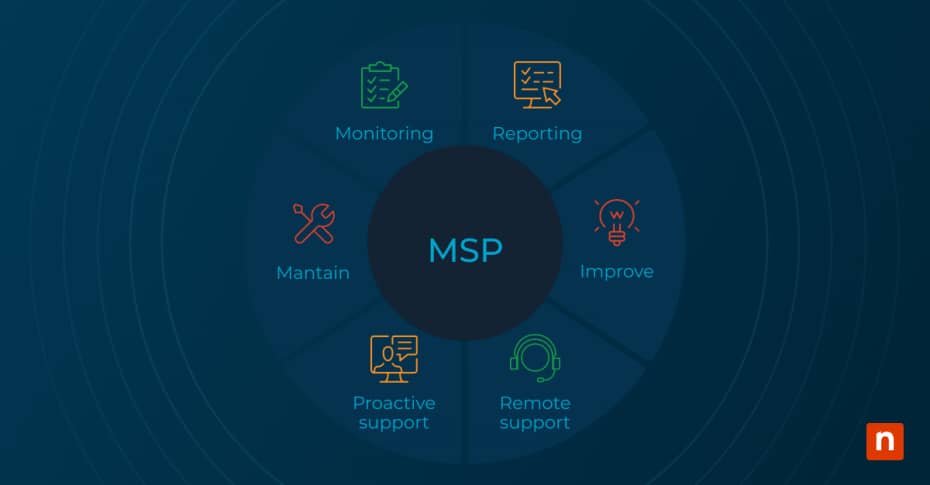In today’s digitally driven world, businesses of all sizes rely heavily on technology to streamline operations, enhance productivity, and drive growth. However, managing complex IT infrastructure and staying ahead of rapidly evolving technologies can be a daunting task for organizations, especially those with limited resources and expertise.
This is where Managed Service Providers (MSPs) can add value. MSPs offer a wide range of IT services and solutions designed to alleviate the burden of IT management and support, allowing businesses to focus on their core objectives. In this guide, we explore the key factors to consider when choosing an MSP, ensuring that you make an informed decision that aligns with your organization’s goals and objectives.
Understanding the role of MSPs
Managed Service Providers (MSPs) play a crucial role in modern IT management by offering comprehensive services such as network monitoring, cybersecurity, cloud computing, data backup, and helpdesk support. By outsourcing IT functions to MSPs, businesses can leverage the expertise of skilled professionals while reducing operational costs. MSPs employ teams of skilled professionals with extensive knowledge in various areas of IT, allowing them to deliver high-quality technology services.
MSPs often provide around-the-clock monitoring and support, reducing the risk of downtime and ensuring rapid response to technical issues, which is essential for business continuity and competitiveness in today’s digital landscape. Additionally, partnering with an MSP allows businesses to focus on core objectives and strategic initiatives, rather than getting bogged down by day-to-day IT tasks.
10 key factors to consider when choosing an MSP
There are many factors to consider when selecting a managed services provider for your organization, some of which can be highly specialized. There are a number of key factors that all organizations should prioritize when searching for managed IT services:
1) Expertise and industry experience
Expertise and industry experience are crucial factors to consider when selecting an MSP. While there are a large number of MSPs in the marketplace, not all will have a depth of experience in every industry vertical. A reputable MSP with extensive experience in your industry will have a deep understanding of your business needs, challenges, and objectives. They will also understand the regulatory frameworks you operate in and help you to both achieve and maintain compliance. They can offer valuable insights, best practices, and tailored solutions to address your specific requirements effectively. By partnering with an experienced MSP, you can leverage their knowledge and expertise to drive innovation, efficiency, and growth in your organization.
2) Service offerings and customization
The range of services offered by an MSP and their ability to customize solutions to meet your unique needs are essential considerations. A versatile MSP that offers a comprehensive suite of services, including proactive monitoring, cybersecurity, disaster recovery, and cloud migration, can provide end-to-end support for your IT infrastructure. Additionally, a flexible MSP that can tailor their solutions to align with your business objectives, budget constraints, and growth plans will ensure that you receive the most value from their services. Some MSPs specialize in specific technologies and cloud platforms, while others are more agnostic. It is not necessarily beneficial to partner with a multi-cloud MSP, but doing so greatly improves future solution portability and provides more strategic options.
3) Scalability and future-proofing
Scalability and future-proofing are critical factors to consider, especially for growing businesses. An MSP that can scale its services and infrastructure to accommodate your company’s growth and evolving technology needs will ensure that you remain competitive and agile in a rapidly changing business landscape. Cost is always a critical factor, especially for small companies and those just beginning their technology journey. MSPs that can build efficient solutions with limited resources and configure them to scale automatically on demand will provide high-performance solutions at the minimum cost possible. Additionally, an MSP that stays abreast of emerging technologies and industry trends can help future-proof your IT infrastructure, enabling you to adapt to new opportunities and challenges effectively by embracing new technologies.
4) Service Level Agreements (SLAs) and support
Service level agreements (SLAs) and support offerings are crucial components of an MSP’s service offering. SLAs define the terms of service, including response times, uptime guarantees, and problem-resolution procedures, ensuring that you receive timely and reliable support when needed. Look for an MSP that offers 24/7 support and emergency response capabilities to address critical issues promptly, minimizing downtime and disruption to your business operations.
5) Security and compliance
Security and compliance are paramount considerations, especially in today’s threat landscape and regulatory environment. An MSP that prioritizes security and compliance can help safeguard your sensitive data, protect your business from cyber threats, and ensure compliance with industry regulations and best practices. Look for an MSP that implements robust security measures, including encryption, access controls, intrusion detection, and vulnerability management, to mitigate risks and enhance your overall security posture. Be mindful of regulatory conditions that may require services to be hosted in a specific geographic region or data not to be shared beyond a regional boundary. In the ‘follow the sun’ support model it is important to know who has access to your data, and where they are located.
6) Pricing and cost transparency
Pricing and cost transparency are essential considerations when selecting an MSP. While cost is undoubtedly a factor, it is essential to consider the overall value proposition offered by an MSP rather than focusing solely on price. Look for an MSP that offers transparent pricing models, clearly outlining the costs associated with their services, including monthly subscriptions, per-device pricing, or tiered plans. Additionally, beware of hidden costs and inquire about additional fees for specific services or features to avoid any surprises down the line. Making sure your budget extends to the costs of operating services is as important as the costs of commissioning. Also, be mindful that the storage and transmission of data has an associated cost, which increases as that data travels across boundaries.
7) Client communication and reporting
Effective communication and reporting are vital aspects of a successful MSP-client relationship. An MSP that maintains open channels of communication and provides regular updates on service status, performance metrics, and key insights will ensure that you remain informed and engaged in the management of your IT infrastructure. Look for an MSP that offers access to performance reports, analytics, and dashboards, allowing you to track the effectiveness of their services and make informed decisions. An MSP that allows support tickets to be raised in ways that support your existing technology operations is hugely advantageous, as are integrations with existing in-house ticketing and knowledge management systems.
8) Technological capabilities and tools
The technological capabilities and tools included by an MSP are critical factors to consider when evaluating their suitability for your organization. An MSP that utilizes state-of-the-art technology, infrastructure, and tools can deliver superior performance, reliability, and efficiency in managing your IT environment. Additionally, ensure compatibility with your existing systems and software to minimize disruptions and integration challenges when transitioning to MSP-managed services.
9) Location and onsite support
Location and onsite support are important practical considerations for businesses that require hands-on assistance or prefer a local MSP. While many MSP services can be delivered remotely, having access to onsite support when needed can be invaluable for troubleshooting, maintenance tasks, or strategic planning sessions. Consider the proximity of the MSP’s physical location to your business premises and inquire about their availability for onsite visits and support engagements.
10) Client references and reviews
Client references and reviews are valuable resources for evaluating an MSP’s performance, reliability, and reputation in the industry. Reach out to existing clients of the MSP to gather firsthand insights into their experiences, satisfaction levels, and the quality of services provided. Additionally, read online reviews, testimonials, and case studies to gain a broader perspective on the MSP’s track record and credibility.
Making a decision
Before deciding on an MSP, it is helpful to have a structured approach to evaluate candidates. Create a comprehensive checklist that encompasses all your organization’s requirements, preferences, and priorities. This checklist will serve as a guideline during the selection process, ensuring that you cover all essential aspects and make a well-informed decision.
Creating a checklist for evaluating MSP candidates
Begin by listing the key factors listed in this guide, which include expertise, service offerings, scalability, SLAs, security, pricing, communication, technological capabilities, location, and client references. Then, break down each factor into specific criteria or questions that you can use to assess MSP candidates thoroughly. For example, under expertise, you might include criteria such as the number of years in business, certifications held by the MSP’s team members, and experience with similar industries or IT environments. Similarly, under security, you might ask about the MSP’s approach to data protection, compliance certifications, and incident response procedures.
As you evaluate MSP candidates, check off each criterion on your checklist and make notes on how well each candidate meets your requirements. This systematic approach will help you compare multiple MSPs objectively and ensure that you do not overlook any critical factors in your decision-making process.
Conducting interviews and site visits
Once you have identified a shortlist of MSP candidates based on your checklist, it is time to engage with them directly through interviews and site visits. These interactions provide valuable opportunities to assess the MSP’s capabilities, culture, and compatibility with your organization.
Schedule interviews with representatives from each MSP to discuss your organization’s needs, goals, and challenges. Prepare a list of questions tailored to each MSP based on your checklist criteria. During the interviews, pay attention to how well the MSP understands your requirements and whether they demonstrate the expertise and experience necessary to meet your needs effectively.
Additionally, consider arranging site visits to the MSP’s facilities, if possible. A site visit allows you to observe firsthand the MSP’s operations, infrastructure, and work environment. Look for signs of professionalism, organization, and efficiency, as well as the availability of resources and technology to support your organization’s needs.
During the site visit, take the opportunity to meet with key personnel, including technical experts, account managers, and support staff. Evaluate their knowledge, communication skills, and responsiveness to your questions and concerns. Engaging directly with the MSP’s team members will give you a sense of the level of support and collaboration you can expect from the partnership.
Final decision and contracts
After completing the evaluation process, carefully review all the information gathered and weigh the pros and cons of each MSP candidate. Take your time to make a well-informed decision that aligns with your organization’s long-term goals and objectives. If necessary, seek input from key stakeholders within your organization to ensure consensus and buy-in for the selected MSP.
Once you have chosen an MSP, it is time to finalize the partnership by negotiating and signing contracts. Review the terms and conditions of the contract carefully, paying close attention to pricing, service level agreements (SLAs), termination clauses, and any additional terms or conditions.
If you have any concerns or questions about the contract, do not hesitate to seek clarification or request modifications before signing. It is essential to establish clear expectations and responsibilities from both parties to ensure a successful and mutually beneficial partnership.
Choose an MSP with confidence
Choosing the right Managed Service Provider (MSP) is a critical decision that requires careful consideration and thorough evaluation. By focusing on the key factors discussed in this guide and following a structured approach to selection, organizations can identify MSPs that align with their needs, goals, and budgetary constraints.
A successful partnership with an MSP can drive innovation, efficiency, and growth for your organization, providing access to specialized expertise, advanced technologies, and responsive support services. By selecting the right MSP, you can streamline your IT operations, mitigate risks, and focus on achieving your business objectives with confidence.
Building an effective IT operations function relies on quality toolsets, including solutions to streamline service delivery. NinjaOne, rated #1 in RMM, endpoint management, and patch management by MSPs and IT companies worldwide, provides a comprehensive suite of services, including monitoring, management, automation, and device security. A single pane of glass offers comprehensive visibility and enables MSPs to deliver high-quality technology services with ease.








